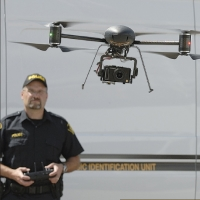Drone Fly-by Interferes with LAPD Helicopter During Hunt for Suspect
 Drone, DraganFlyer X6 (photo: helifever.com)
Drone, DraganFlyer X6 (photo: helifever.com)
Last year, the Federal Aviation Administration (FAA) opened the door for commercial use of drones when it green-lighted requests for permission from half a dozen Hollywood companies. Hobbyists were, and still are, the dominant drone force in the skies as the burgeoning billion-dollar industry feels its way through the thicket of evolving regulation.
While all that gets sorted out, a drone flying over Sunset Boulevard and Gower Street in the heart of Hollywood came close to a Los Angeles Police Department (LAPD) helicopter on Friday night and disrupted the search for a fleeing suspect. The drone operator was arrested at a nearby Rite-Aid parking lot.
CBS Los Angeles said the cops indicated he might be charged with felony assault on a police officer. “Our pilot looked up and saw two red lights coming at him,” Capt. Al Lopez told them “The pilot had to stress the machine to lower it. It placed our pilot in immediate danger.”
There is no serious discussion about banning drones until policies have been discussed, publicized and put in place by lawmakers and regulators. That is not how California rolls on issues of public safety, like drones, fracking, building in earthquake zones and the draining of groundwater.
State lawmakers are developing targeted drone laws on the fly, often as highly-publicized incidents make ignoring the problem difficult. A year ago, LAPD got pretty ticked off about Torrance resident Daniel Saulmon flying his drones over DUI checkpoints, traffic stops, police stations and other places where he suspects misconduct by the authorities.
This year, pending Senate Bill 170 would make it a misdemeanor for knowingly flying a drone over a prison or jail.
Other drone bills are stacked up on the runway. Senate Bill 271 would make it against the law to fly less than 350 feet over a K-12 school. The police, as usual, are exempted and the media, in this case, could zoom in as long as the school doesn’t tell them to cut it out.
Assembly Bill 856 would make a person liable for physical invasion of privacy, as if they’d walked onto the property, for using a drone to record sound or visual images of a person engaging in “personal or familial activity.”
Other bills under consideration would restrict law enforcement’s use of drones. They can’t weaponize the aircraft—only cops in North Dakota can do that—but Senate Bill 262 would add some more restrictions and require cops to clear drone surveillance of private property with local governing bodies. Assembly Bill 56 would make cops get a warrant for drone surveillance of private property and require them to destroy any recordings made within one year.
But the bill that has advanced the farthest, Senate Bill 142, would make flying a drone under 350 feet over private property a trespass. The Senate passed the bill last week and is sending it to the governor for his signature. Its author, Senator Hannah-Beth Jackson (D-Santa Barbara), said she was inspired to propose the law after being buzzed by a drone while on vacation in Hawaii.
Lawmakers can continue to churn out legislation until January 1, 2018, when the game changes—if Assembly Bill 14 is approved now. It establishes the Unmanned Aircraft Systems Task Force, which would present the governor with a policy draft and suggested legislation in about two and a half years.
–Ken Broder
To Learn More:
Drone Operator Taken into Custody after Close Call with LAPD Helicopter in Hollywood (ABC Los Angeles)
Hobby Drone Flies Within 50ft of LAPD Helicopter, Derails a Suspect Search (by Nathan Mattise, Ars Technica)
CA Ban on Low Drones over Homes Put to Gov. (by Nick Cahill, Courthouse News Service)
As Drone Use Spreads, California Lawmakers Push for Control (by Jeanne Kuang, Sacramento Bee)
Drone Exemptions for Hollywood Pave the Way for Widespread Use (by Brooks Barnes, New York Times)
LAPD Acquires 2 Drones, Promises to Barely Use Them and Won’t Call Them Drones (by Ken Broder, AllGov California)
- Top Stories
- Controversies
- Where is the Money Going?
- California and the Nation
- Appointments and Resignations
- Unusual News
- Latest News
- California Forbids U.S. Immigration Agents from Pretending to be Police
- California Lawmakers Urged to Strip “Self-Dealing” Tax Board of Its Duties
- Big Oil’s Grip on California
- Santa Cruz Police See Homeland Security Betrayal in Use of Gang Roundup as Cover for Immigration Raid
- Oil Companies Face Deadline to Stop Polluting California Groundwater





